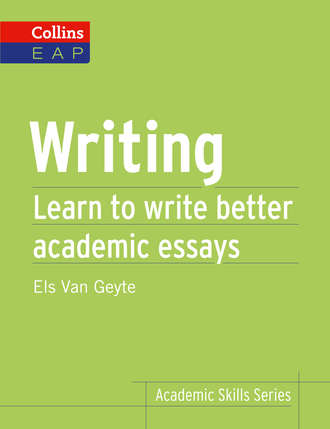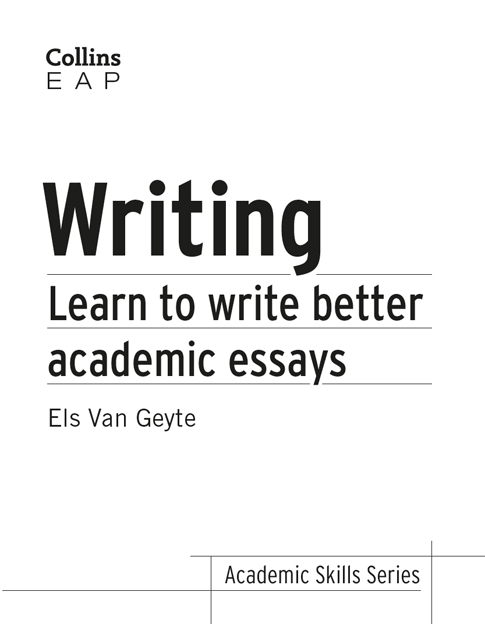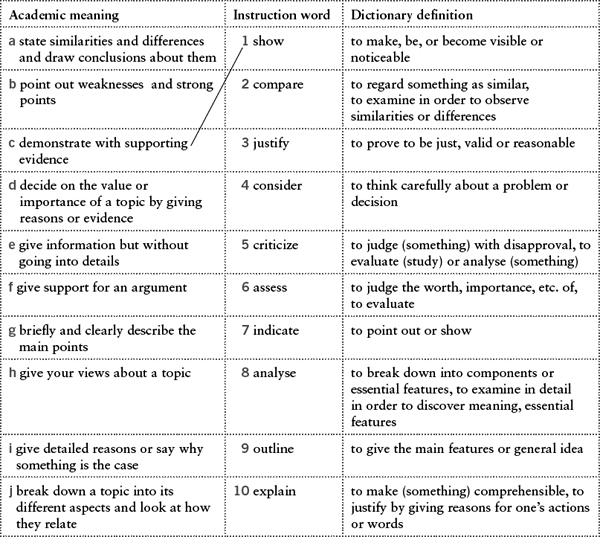
Полная версия
Writing: B2+


Collins
HarperCollinsPublishers
77-85 Fulham Palace Road
Hammersmith
London W6 8JB
First edition 2013
© HarperCollins Publishers 2013
www.harpercollins.co.uk
Collins® is a registered trademark of HarperCollins Publishers Limited
www.collinselt.com
A catalogue record for this book is available from the British Library
All rights reserved under International and Pan-American Copyright Conventions. By payment of the required fees, you have been granted the non-exclusive, non-transferable right to access and read the text of this e-book on screen. No part of this text may be reproduced, transmitted, downloaded, decompiled, reverse engineered, or stored in or introduced into any information storage and retrieval system, in any form or by any means, whether electronic or mechanical, now known or hereinafter invented, without the express written permission of HarperCollins.
HarperCollinsPublishers has made every reasonable effort to ensure that any picture content and written content in this ebook has been included or removed in accordance with the contractual and technological constraints in operation at the time of publication.
HarperCollins does not warrant that www.collinselt.com or any other website mentioned in this title will be provided uninterrupted, that any website will be error free, that defects will be corrected, or that the website or the server that makes it available are free of viruses or bugs. For full terms and conditions please refer to the site terms provided on the website.
If any copyright holders have been omitted, please contact the Publisher who will make the necessary arrangements at the first opportunity.

The 4.5-billion-word Collins Corpus is the world’s largest database of the English language. It is updated every month and has been at the heart of Collins COBUILD publishing for over 20 years. All definitions provided in the glossary boxes in this book have been taken from the Collins COBUILD Advanced Dictionary.
Source ISBN: 9780007507108
Ebook Edition © May 2014 ISBN 9780008101794
Version: 2014-07-02
Contents
Title Page
Copyright
Introduction
Chapter 1 Essay purpose and instructions
understand what academic writing is
understand the purpose of essays
analyse essay titles
Chapter 2 Reader expectation and essay structure
plan your essay structure
guide your reader with signposting and cohesion
understand paragraph structure and how to connect paragraphs
Chapter 3 Essay content and language
explain the time frame, situation and certainty
define key terms and concepts
indicate the importance of the topic and organization of the essay
use organizational patterns and visuals
understand the language of conclusions
Chapter 4 Formality, efficiency, modesty and clarity
understand formality in register and style
understand efficiency in register and style
understand modesty in register and style
understand clarity in register and style
Chapter 5 Accuracy
improve accuracy
choose the correct tense
focus on subject-verb agreement
use punctuation correctly
use articles correctly
become aware of common errors
Chapter 6 Research and analysis
develop research skills
identify suitable sources
develop note-making skills
decide on level of detail and what is relevant
develop critical thinking skills
Chapter 7 Reading comprehension
enhance reading comprehension
analyse sentence structure
analyse noun phrases
identify structural and argumentational signposts
Chapter 8 Authority
develop a clear point of view
state your opinion
use ‘I’, ‘we’ and other personal pronouns appropriately
evaluate the strength of your own arguments
Chapter 9 Integrity
acknowledge the ideas of others
know when to cite
know whether to quote or paraphrase
use citing and referencing techniques
understand plagiarism better
avoid plagiarism
Chapter 10 Paraphrasing
use a technique to paraphrase accurately
use paraphrases to show own opinion
integrate paraphrases grammatically
use paraphrases to summarize
Chapter 11 Essay process and presentation
the stages in the essay writing process
time management
presentation
other types of academic writing
Appendices Appendix 1 – Essay examples: Taking your writing up to the next level
Appendix 2 – Responding to marking criteria and feedback
Appendix 3 – Useful phrases
Glossary
Answer key
Acknowledgements
About the Author
About the Publisher
Introduction
Collins Academic Skills Series: Writing will build on your existing writing skills to enable you to produce successful academic essays.
Designed to be used on a self-study basis to support English for Academic Purposes or study skills courses, it is intended for students on pre-sessional or Foundation courses as well as for first year undergraduate students.
The book has eleven chapters which focus on helping you understand what is expected of you at university. It will help you with research, planning, organization, grammar, paraphrasing and much more. It will make you think about:
the writing purpose (Chapter 1)
the expectations of the academic reader (Chapters 2 and 4)
content and research (Chapters 3 and 6)
academic principles (Chapters 4, 5, 8 and 9)
language points (Chapters 3, 5, 7 and 10)
the writing process from start to finish (Chapter 11)
At the back of the book you will find:
example essays: a short essay and a complete university essay, with comments on their strengths, weaknesses and differences
advice on how to respond to marking criteria and assignment feedback
a glossary of key terms
a comprehensive answer key.
Chapter structure
Each chapter includes:
Aims – These set out the skills covered in the chapter.
A self-evaluation quiz – By doing this you are able to identify what you already know on the subject of the chapter and what you need to learn.
Information on academic expectations and guidelines on how to develop academic skills – These sections will help you understand university practices and expectations so you know what is required.
Practical exercises – These help you develop the skills to succeed at university. You can check your answers at the back of the book.
Tips – Key points are highlighted for easy reference and provide useful revision summaries for the busy student.
Glossary – Difficult words are glossed in boxes next to where the text appears in the chapter. There is also a comprehensive glossary at the back of the book.
Remember section – This is a summary of key points for revision and easy reference.
Authentic academic texts
The book uses excerpts from academic essays, written by students who study a variety of subjects, so that you can apply what you learn to your own academic context.
Glossary boxes

Where we feel that a word or phrase is difficult to understand, we have glossed this word or phrase. All definitions provided in the glossary boxes have been taken from the Collins COBUILD Advanced Dictionary. At the end of the book there is a full alphabetical list of the most difficult words from the book for your reference.
Using Writing
You can either work through the chapters from Chapter 1 to Chapter 11 or you can choose the chapters and topics that are most useful to you. The Contents page will help in your selection.
Study tips
Each chapter will probably take between three and four hours. Take regular breaks and do not try to study for too long. Thirty to sixty minutes is a sensible study period.
Regular study is better than occasional intensive study.
Read the chapter through first to get an overview without doing any exercises. This will help you see what you want to focus on.
Try the exercises before checking the Answer key. Be an active learner.
When writing your own essays, refer back to the appropriate sections and exercises in the book. If possible, ask a more experienced writer to give you feedback on your essay drafts.
All university departments are different. Use the information in the book as a guide to investigating your own university department.
Read carefully any information you receive from your department about what and how to write.
Don’t think of an essay as a finished product, but as a learning process. It is an opportunity to show that you can find out information about a subject, develop your own ideas about it, organize your thoughts and communicate your understanding to others. Don’t rush this process, but find out what works best for you. Adapt the suggestions in this book to suit your learning style and context.
With practice, writing will become easier, and your confidence will grow so that you can show your tutors your true ability and potential. We wish you every success in your academic career.
Other titles
Also available in the Collins Academic Skills Series: Research, Lectures, Numbers, Presenting, and Group Work.
1

Aims
understand what academic writing is
understand the purpose of essays
analyse essay titles

Quiz
Self-evaluation
For each statement below, circle the word which is true for you.
1 I understand what academic writing is. agree | disagree | not sure 2 I understand the purpose of essays. agree | disagree | not sure 3 I know the academic meaning of instruction words in essays. agree | disagree | not sure 4 I can find key words in essay titles to help me understand what I am expected to write. agree | disagree | not sure 5 I can analyse the structure of an essay question to give a full answer and include the right information. agree | disagree | not sure 6 I know who to go to at my university if I need advice about an essay. agree | disagree | not sureTip
When you start your degree, you will come across a lot of new words which are specific to your new environment but everybody seems to think you already understand them. Don’t worry about this, but look them up as soon as possible. In this book, the words are explained in the glossary boxes and they are all in the glossary at the back.
What is academic writing?
Academic writing is writing which is done by scholars (students or academics) for other scholars to read. It can take many forms: journal articles, textbooks, dissertations, group project reports, etc. Although students are increasingly being asked to write different types of academic text, the essay still remains the most popular type of assignment.
Essays are written by students and are likely to be read by one person only: their tutor. The essay can be set as a coursework assignment to assess a student’s understanding of a module, or as an exam question.
For more information on some other types of academic writing, see Chapter 11.
Glossary
dissertation (dissertations) N-COUNT A dissertation is a long formal piece of writing on a particular subject, especially for a university degree.
The purpose of essays
Essays are a common form of assessment, for example in disciplines such as Business, International Relations, Law, History, Geography, Theology, Communication Studies, Education and Economics.
Glossary
discipline (disciplines) N-COUNT A discipline is a particular area of study, especially a subject of study in a college or university.
There are many reasons why essays are still the most popular type of assignment. One of them is that they ask students to demonstrate more than just knowledge. To demonstrate the purpose of essays, let’s have a look at the difference between an ordinary question and an essay question.
Ordinary question: Why did William of Normandy win the Battle of Hastings? Essay question: William of Normandy’s victory at the Battle of Hastings has often been attributed to his large and well-prepared army. However, without strategy and good fortune, he might well have lost the battle. Discuss.The answer to the ordinary question could be a list of items, in no particular order of importance. The essay question directs the writer more: the student has to mention the size and the preparedness of the army, describe William’s strategy and the fortunate circumstances, and decide how important these elements were for the victory. In order to come to a conclusion about this, the writer has to do research. This is indicated in the language: in the first sentence ‘has often been attributed to’ tells the student that there are a lot of sources which she should look at to explain this point of view, and ‘However’ in the second sentence suggests that there is also evidence available for a contrasting opinion. The word ‘Discuss’ makes it clear that there are different points to be made, which should be mentioned and commented on, so that the writer can make a decision about which side she is on.
Glossary
attribute to (attributes to, attributing to, attributed to) VERB If you attribute something to an event or situation, you think that it was caused by that event or situation.
seminar (seminars) N-COUNT A seminar is a class at a college or university in which the teacher and a small group of students discuss a topic.
convention (conventions) N-COUNT Academic conventions are traditional methods or styles of academic writing.
Clearly, a finished essay demonstrates more than just the knowledge students were taught about a subject. The writers will have:
found out much more than what they were taught in lectures and seminars
weighed up the evidence about different points of view
developed their own point of view
increased their knowledge and their depth of understanding
trained their memory to remember the important facts
undertaken activities that prepare them for their future profession.
By writing the information down in essay form, they will have:
organized their thoughts
practised and improved their ability to communicate in writing
shown awareness of the reader, of academic conventions and the way others write in their discipline.
If you plan your time so that you can read up on a topic, think critically about it, follow the essay instructions, and express your view clearly in a well-organized text, you deserve a good grade.
For more information on all these aspects, see later chapters.
Analysing essay titles
Although we called the instructions in the example essay question a question, there was no question mark. The ‘questions’ are really titles. You will need to put the full title on your first page; don’t be tempted to summarize the question and write your own title.
Your tutor may give you a long essay title, which needs to be broken down into smaller parts before it can be addressed. All essay questions will include instruction words, such as ‘discuss’. For international students, these words can be particularly tricky. If you look them up in a dictionary, you may find a large number of meanings that do not always correspond exactly to the more specific meaning in the academic context, which is also why translations into other languages you may speak are unlikely to help.
For example, this is a dictionary definition of ‘discuss’:
1 to have a conversation about; consider by talking over; debate
2 to treat (a subject) in speech or writing ⇒ the first three volumes discuss basic principles
(Source: Collins COBUILD Advanced Dictionary, 2008)
Both definitions suggest that ‘discuss’ means ‘talk (or write) about’. However, in an academic context ‘discuss’ often means something more specific: in order to discuss, you need to refer to different aspects of a topic, look at the benefits and drawbacks of different points of view, and give your own conclusion.

Exercise 1
In which of these essay questions does ‘discuss’ mean ‘write about, describe’, and in which does it mean more? Put a tick in the correct column.
= write about, describe = give different points of view (and your opinion) 1 Parliament today is less effective than it has ever been. Discuss. 2 Discuss the geological history and likely method of formation of the Lewisian rocks. 3 Discuss the circumstances that can lead to a dramatic change in the use of technology. 4 ‘Current stem cell technology is sufficiently advanced for use in medicine.’ Discuss.
Exercise 2
In the table below, match the instruction words in the centre column with the correct academic meanings on the left. Some of the first and/or second dictionary definitions of the instruction words on the right may help you find their academic meaning.

Tip
Read academic texts in your own discipline to become more aware of the conventions. For example, the instruction word ‘sketch’ can have completely different meanings dependent on the context. To an engineer it can mean ‘draw’, to a theologian it is more likely to mean ‘give a brief description’.
Analysing key words and structure of essay titles
Underlining or highlighting key words is a good technique which you are probably familiar with. The following is an example of an IELTS-type essay question where the most important words have been highlighted (you may find a similar question in the TOEFL test):


